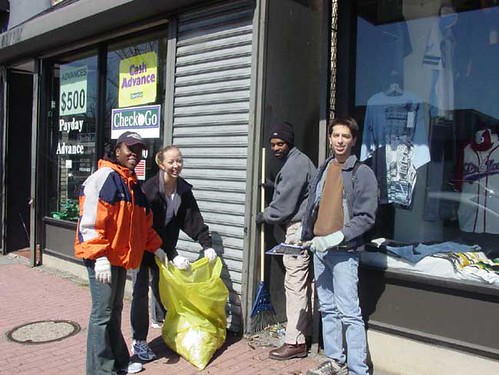When you teach people in relatively authoritarian settings for most of their life, how realistic is it to expect them to be engaged?

Picking up litter on H Street, March 2004.
When I was an involved student in college, when people would talk about "apathy", i.e., "student apathy" or a lack of interest in getting involved in issues on campus, be it about the quality of teaching, the university's policies about student conduct, the building program, or the US involvement in El Salvador, etc., besides the fact that students were typically on campus only for four years, and saw their stay as relatively temporary, the other thing I used to say was:
Published online in the Journal of Personality and Social Psychology, the study finds Millennials (born 1982-2000) more civically and politically disengaged, more focused on materialistic values, and less concerned about helping the larger community than were GenX (born 1962-1981) and Baby Boomers (born 1946 to about 1961) at the same ages.
It does find "some good trends," such as a rise in volunteering and a decline in prejudice based on race, gender, and sexual orientation — the result of more individualism, says Jean Twenge, professor of psychology at San Diego State University, one of the study's authors.
Getting back to my point about being a subject--lectured at--rather than being more engaged in the world around you for most of your life during school-time, why should anyone be surprised that people aren't engaged in the world around them?
So besides developing opportunities for engagement in school settings (just like universities have service-learning programs) and neighborhood settings, we need to rethink, reorganize, and restructure our civic organizations and governance structures so that people--including children and adolescents--have the opportunity to, can be, and are engaged in an equitable fashion, whereas most civil organizations are more oriented to privileging participation for a subset of people, and representative democracy--government--isn't set up to engage people all that much, except as "eye candy."
That doesn't mean that there aren't ways to engage citizens, from subsidiary governance structures like Community Boards in New York City, or sub-city borough governments in places like London or Montreal, to planning organizations like Neighborhood Planning Units in Atlanta, participatory budgeting methods to guide certain types of appropriation and grant decisions.
But there is no question that we need to focus first on the level of engagement that is possible within current structures and systems, and work to improve it, rather than continually blaming particular groups for not participating... (this also happens with regard to voting, see the various pronouncements from the Center for the American Electorate).
Labels: civic engagement, community organizations, participatory democracy and empowered participation



0 Comments:
Post a Comment
<< Home